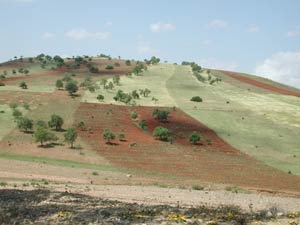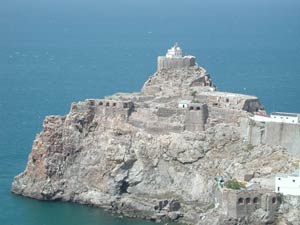"Badis
is a town built on the Mediterranean. The Spanish call it Velez de
la Gomera. It has about 600 homes. Some of our historians say it was
built by Africans, others think it was built by the Goths. Regardless,
it is built between two high mountains, near a big valley which turns
into a river when it rains. The town has a market with many stalls
and a decent sized mosque. However, there is no drinking water. There
is a well outside the town, near a saint's tomb: it's dangerous to
draw water from this well at night, for it is filled with leaches.The
inhabitants are either fishermen or corsairs. The latter attack Christian
coasts with their ships.
Around
Badis, the mountains are high and dry. They are full of good wood
for building ships. The mountain dwellers live off of this wood commerce.
Wheat does not grow in this region, so bread is made of barley. People
mostly eat sardines and other fish, for fishermen take in so many
fish that they need the help of locals to lift their nets. So the
poor usually linger on the beaches, offering their help to incoming
boats. Sardines are salted and sent into the mountains. The town still
has a Jewish quarter, where one can buy wine. Locals believe wine
is a divine liquor. Every night, in the warm months, the people go
out in rowing boats, and drink and sing.Badis
has a fort, but not a very strong one. The local lord lives there.
Nearby, he has a palace with a beautiul garden.
On
the seafront there is a boat building business, making galleys and
smaller boats; as the lord often sends armored ships to Christian
lands. This is why King Fernando of Spain sent a fleet commanded by
Pedro Navarro to take control of an island just across Badis.
On that island, he built a fort, filled it with soldiers, food and
arms. The Spanish aimed at people in the streets, and killed a few.
The lord of Badis asked the King of Fes for help, and the latter sent
troops to his defense. But many of these were killed, others were
made prisonners and the rest fled back to Fes, wounded. The Christians
held on to this island for 11 years, until the King of Fes sent another
army to defeat them. Thanks to the help of a Spanish soldier who killed
his captain for having slept with his wife, the island went back to
the Moors. They killed all the Christians, but the treacherous soldier
and his wife, whom they warmly thanked for their help. I heard this
story in Naples, from people who were there. At the time I was in
Fes.Nowadays,
the lord of Badis looks over the island with the greatest care, thanks
to the King of Fes, who needs to protect it as it is the closest Mediterranean
port to Fes, though distant by 120 miles.Venician
galleys come to Badis twice a year with their goods. They trade and
sell there. They also transport both goods and people to Tunis, and
sometimes as far as Venice or Alexandria or Beirut. "
(Leo,
274)